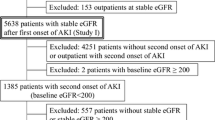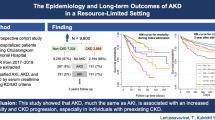Abstract
Background
Identifying individuals who are at increased risk for accelerated progressive chronic kidney disease (CKD) and who might benefit from preventive interventions is an important challenge.
Methods
The present observational study evaluated the effect of an episode of Acute Kidney Injury (AKI) on the evolution of the renal trajectory in a cohort of 311 ambulatory CKD patients. We analyzed the evolution of eGFR in this cohort within a 5-year time window around an AKI episode. The mean of the available eGFR-values over a 6 month period was calculated once at the start and once at the end of the 5-year period. Slow and fast CKD progression were defined as a decrease by respectively ≤ or >1 category of 15 ml/min/1.73 m2 over the 5-year time window. The influence of AKI on progression status was analyzed.
Results
Median eGFR decline over the 5 year period was 11, 22 and 6 ml/min/1.73 m2 in the total, AKI and no AKI group respectively. AKI occurred in 44/72 versus 50/239 of fast versus slow progressors (odds ratio: 5.9, 95 % confidence interval: 3.4–10.5). An incomplete recovery of eGFR after an AKI episode (median in overall, fast progressors, slow progressors 11, 20 and 4 ml/min/1.73 m2 respectively) was the major component for the overall loss of renal function over the 5-year window. Our data failed to provide evidence that the CKD progression became more accelerated once kidney function was stabilized after the AKI episode.
Conclusions
Incomplete recovery of AKI was related with accelerated CKD-progression. Episodes of AKI were not associated with an accelerated decline of kidney function once the AKI episode had resolved. In the group without AKI episode, the progression was similar to that of the general population without CKD.



Similar content being viewed by others
References
Meguid El Nahas A, Bello AK (2005) Chronic kidney disease: the global challenge. Lancet 365(9456):331–340. doi:10.1016/S0140-6736(05)17789-7
Goldstein SL, Jaber BL, Faubel S, Chawla LS, Acute Kidney Injury Advisory Group of American Society of N (2013) AKI transition of care: a potential opportunity to detect and prevent CKD. Clin J Am Soc Nephrol CJASN 8(3):476–483. doi:10.2215/CJN.12101112
Turin TC, Coresh J, Tonelli M, Stevens PE, de Jong PE, Farmer CK, Matsushita K, Hemmelgarn BR (2013) Change in the estimated glomerular filtration rate over time and risk of all-cause mortality. Kidney Int 83(4):684–691. doi:10.1038/ki.2012.443
Perkins RM, Bucaloiu ID, Kirchner HL, Ashouian N, Hartle JE, Yahya T (2011) GFR decline and mortality risk among patients with chronic kidney disease. Clin J Am Soc Nephrol CJASN 6(8):1879–1886. doi:10.2215/CJN.00470111
Pereira MB, Zanetta DM, Abdulkader RC (2012) The real importance of pre-existing comorbidities on long-term mortality after acute kidney injury. PLoS One 7(10):e47746. doi:10.1371/journal.pone.0047746
Rosansky SJ (2012) Renal function trajectory is more important than chronic kidney disease stage for managing patients with chronic kidney disease. Am J Nephrol 36(1):1–10. doi:10.1159/000339327
Lebiedz P, Knickel L, Engelbertz C, Luders F, Gebauer K, Berdel WE, Waltenberger J, Reinecke H (2014) Impact of preexisting chronic kidney disease on acute and long-term outcome of critically ill patients on a medical intensive care unit. J Nephrol 27(1):73–80. doi:10.1007/s40620-013-0016-1
Collins GS, Omar O, Shanyinde M, Yu LM (2013) A systematic review finds prediction models for chronic kidney disease were poorly reported and often developed using inappropriate methods. J Clin Epidemiol 66(3):268–277. doi:10.1016/j.jclinepi.2012.06.020
Obrador GT, Mahdavi-Mazdeh M, Collins AJ, Global Kidney Disease Prevention N (2011) Establishing the global kidney disease prevention network (KDPN): a position statement from the National Kidney Foundation. Am J Kidney Dis Off J Nat Kidney Found 57(3):361–370. doi:10.1053/j.ajkd.2010.12.006
Turin TC, Coresh J, Tonelli M, Stevens PE, de Jong PE, Farmer CK, Matsushita K, Hemmelgarn BR (2012) Short-term change in kidney function and risk of end-stage renal disease. Nephrol Dial Transplant Off Publ Euro Dial Trans Assoc Euro Renal Assoc 27(10):3835–3843. doi:10.1093/ndt/gfs263
Bucaloiu ID, Kirchner HL, Norfolk ER, Hartle JE 2nd, Perkins RM (2012) Increased risk of death and de novo chronic kidney disease following reversible acute kidney injury. Kidney Int 81(5):477–485. doi:10.1038/ki.2011.405
Lameire NH, Bagga A, Cruz D, De Maeseneer J, Endre Z, Kellum JA, Liu KD, Mehta RL, Pannu N, Van Biesen W, Vanholder R (2013) Acute kidney injury: an increasing global concern. Lancet 382(9887):170–179. doi:10.1016/S0140-6736(13)60647-9
Van Berendoncks AM, Elseviers MM, Lins RL, Group SS (2010) Outcome of acute kidney injury with different treatment options: long-term follow-up. Clin J Am Soc Nephrol CJASN 5(10):1755–1762. doi:10.2215/CJN.00770110
Wald R, Quinn RR, Luo J, Li P, Scales DC, Mamdani MM, Ray JG, University of Toronto Acute Kidney Injury Research G (2009) Chronic dialysis and death among survivors of acute kidney injury requiring dialysis. JAMA J Am Med Assoc 302(11):1179–1185. doi:10.1001/jama.2009.1322
Chawla LS, Amdur RL, Amodeo S, Kimmel PL, Palant CE (2011) The severity of acute kidney injury predicts progression to chronic kidney disease. Kidney Int 79(12):1361–1369. doi:10.1038/ki.2011.42
Belayev LY, Palevsky PM (2014) The link between acute kidney injury and chronic kidney disease. Curr Opin Nephrol Hypertens 23(2):149–154. doi:10.1097/01.mnh.0000441051.36783.f3
Hsu CY (2012) Yes, AKI truly leads to CKD. J Am Soc Nephrol JASN 23(6):967–969. doi:10.1681/ASN.2012030222
Basile C (2008) The long-term prognosis of acute kidney injury: acute renal failure as a cause of chronic kidney disease. J Nephrol 21(5):657–662
Ronco C, Rosner MH (2012) Acute kidney injury and residual renal function. Crit Care 16(4):144. doi:10.1186/cc11426
Chawla LS, Kimmel PL (2012) Acute kidney injury and chronic kidney disease: an integrated clinical syndrome. Kidney Int 82(5):516–524. doi:10.1038/ki.2012.208
Hoefield RA, Kalra PA, Lane B, O’Donoghue DJ, Foley RN, Middleton RJ (2013) Associations of baseline characteristics with evolution of eGFR in a referred chronic kidney disease cohort. QJM Mon J Assoc Phys 106(10):915–924. doi:10.1093/qjmed/hct115
Zhang AH, Tam P, LeBlanc D, Zhong H, Chan CT, Bargman JM, Oreopoulos DG (2009) Natural history of CKD stage 4 and 5 patients following referral to renal management clinic. Int Urol Nephrol 41(4):977–982. doi:10.1007/s11255-009-9604-3
Levey AS, Stevens LA, Schmid CH, Zhang YL, Castro AF 3rd, Feldman HI, Kusek JW, Eggers P, Van Lente F, Greene T, Coresh J, Ckd EPI (2009) A new equation to estimate glomerular filtration rate. Ann Intern Med 150(9):604–612
Bellomo R, Ronco C, Kellum JA, Mehta RL, Palevsky P, Acute Dialysis Quality Initiative Workgroup (2004) Acute renal failure–definition, outcome measures, animal models, fluid therapy and information technology needs: the Second International Consensus Conference of the Acute Dialysis Quality Initiative (ADQI) Group. Crit Care 8(4):R204–R212. doi:10.1186/cc2872
Davies DF, Shock NW (1950) Age changes in glomerular filtration rate, effective renal plasma flow, and tubular excretory capacity in adult males. J Clin Investig 29(5):496–507. doi:10.1172/JCI102286
Rowe JW, Andres R, Tobin JD, Norris AH, Shock NW (1976) The effect of age on creatinine clearance in men: a cross-sectional and longitudinal study. J Gerontol 31(2):155–163
Macedo E, Zanetta DM, Abdulkader RC (2012) Long-term follow-up of patients after acute kidney injury: patterns of renal functional recovery. PLoS One 7(5):e36388. doi:10.1371/journal.pone.0036388
Jones J, Holmen J, De Graauw J, Jovanovich A, Thornton S, Chonchol M (2012) Association of complete recovery from acute kidney injury with incident CKD stage 3 and all-cause mortality. Am J Kidney Dis Off J Nat Kidney Found 60(3):402–408. doi:10.1053/j.ajkd.2012.03.014
Magden K, Yildirim I, Kutu M, Ozdemir M, Peynir S, Altas A, Yildiz G, Hur E (2013) Recovery process in patients followed-up due to acute kidney injury. Hippokratia 17(3):239–242
Conflict of interest
On behalf of all authors, the corresponding author states that there is no conflict of interest.
Ethical approval
Collection of samples and patient medical data was approved by the ethical committee of the Ghent University Hospital.
Author information
Authors and Affiliations
Corresponding author
Electronic supplementary material
Below is the link to the electronic supplementary material.
Rights and permissions
About this article
Cite this article
D’hoore, E., Neirynck, N., Schepers, E. et al. Chronic kidney disease progression is mainly associated with non-recovery of acute kidney injury. J Nephrol 28, 709–716 (2015). https://doi.org/10.1007/s40620-015-0181-5
Received:
Accepted:
Published:
Issue Date:
DOI: https://doi.org/10.1007/s40620-015-0181-5




